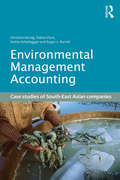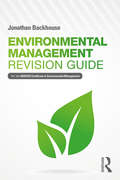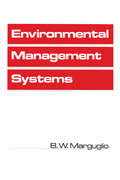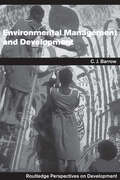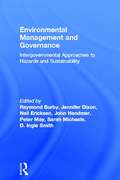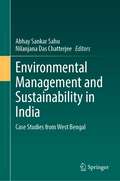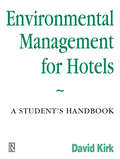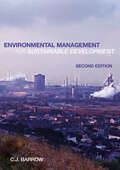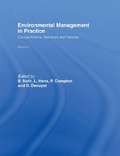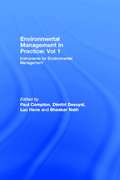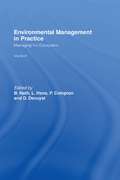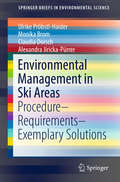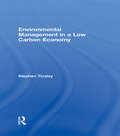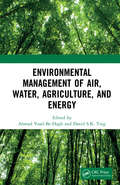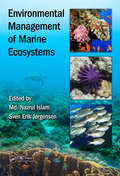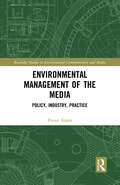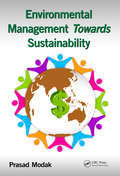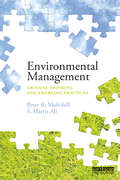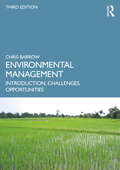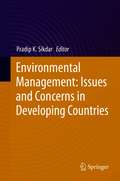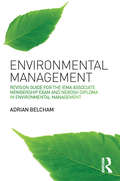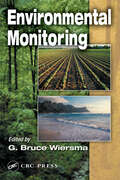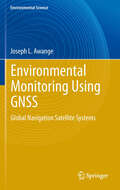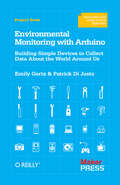- Table View
- List View
Environmental Management Accounting: Case Studies of South-East Asian Companies (Eco-efficiency In Industry And Science Ser. #12)
by Stefan Schaltegger Roger L. Burritt Christian Herzig Tobias ViereSustainable development will not happen without substantial contributions from and leading roles of companies and business organizations. This requires the provision of adequate information on corporate social and ecological impacts and performance. For the last decade, progress has been made in developing and adapting accounting mechanisms to these needs but significant work is still needed to tackle the problems associated with conventional accounting. Until recently, research on environmental management accounting (EMA) has concentrated on developed countries and on cost–benefit analysis of implementing individual EMA tools. Using a comparative case study design, this book seeks to redress the balance and improve the understanding of EMA in management decision-making in emerging countries, focussing specifically on South-East Asian companies. Drawing on 12 case studies, taken from a variety of industries, Environmental Management Accounting: Case Studies of South-East Asian Companies explores the relationship between decision situations and the motivation for, and barriers to, the application of clusters of EMA tools as well as the implementation process itself. This book will be useful to scholars interested in the environmental and sustainability management accounting research field and those considering specific approaches to EMA within emerging economies.
Environmental Management Revision Guide: For the NEBOSH Certificate in Environmental Management
by Jonathan BackhouseThe Environmental Management Revision Guide: For the NEBOSH Certificate in Environmental Management is the perfect revision aid for students preparing to take their NEBOSH Certificate in Environmental Management. As well as being a handy companion volume to Brian Waters’ NEBOSH-endorsed textbook Introduction to Environmental Management, it will also serve as a useful aide-memoire for those in environmental management roles. The book aims to: Provide practical revision guidance and strategies for students Highlight the key information for each learning outcome of the current NEBOSH syllabus Give students opportunities to test their knowledge based on NEBOSH style questions and additional exercises Provide details of guidance documents publically available that students will be able to refer to. The revision guide is fully aligned to the current NEBOSH syllabus, providing complete coverage in bite-sized chunks, helping students to learn and memorise the most important topics. Throughout the book, the guide refers back to the Introduction to Environmental Management, helping students to consolidate their learning.
Environmental Management Systems
by B. MarguglioThis book discusses the features of the environmental policies and procedures that should exist at the plant level and thus helps utility, petrochemical, chemical, pharmaceutical, and other manufacturing industries benefit technically and economically by implementing these feature.
Environmental Management and Development (Routledge Perspectives on Development)
by Chris BarrowThe environment and its management has been, and continues to be a very topical issue. Existing environment and development texts place emphasis is on listing problems, making warnings and voicing advocacy, but by focusing on environmental management, this informative book offers a very different perspective. Moving on from the usual much-discussed viewpoints, Barrow looks towards practical management and problem-solving techniques. He clarifies the definition, nature and role of environmental management in development and developing countries, beginning with an introduction to the key terms, issues and tools of environmental management, which are linked and developed in later chapters, and concluding by discussing who pays for environmental management and its future in developing countries. Written by an experienced and well-known author, this clear, user-friendly book, ideal for students of resource management, geography and development studies, makes excellent use of chapter summaries, boxed case studies, annotated further readings and websites, discussion questions and illustrations.
Environmental Management and Governance: Intergovernmental Approaches to Hazards and Sustainability
by Raymond J. Burby Neil J. Ericksen Jennifer E. Dixon Peter J. May John W. Handmer Sarah Michaels D. Ingle SmithProblems for environmental management are taking on a new urgency. This book addresses aspects of environmental management that raise fundamental questions about governmental roles and the relationship of humans to the environment. It examines the interaction of local and national governments and the strengths and weaknesses of co-operative vs. coercive environmental management, through a focus on the management of natural hazards. Leading experts in the field examine new and innovative environmental management and planning programmes with particular focus on North America and Australia. This book offers a new understanding of environmental problems and explores the appropriate policy mix that must be developed for environmental management to strive towards environmental sustainability.
Environmental Management and Sustainability in India: Case Studies from West Bengal
by Nilanjana Das Chatterjee Abhay Sankar SahuThis volume explores the spatial side of sustainability using cases from India. It provides a variety of chapters from scholars from West Bengal and elsewhere in the country, highlighting spatial perspectives on environmental issues and offering insight on sustainable development in the subcontinent from a geographical perspective. A wide variety of topics are covered here, including but not limited to mitigation of and adaptation to climate issues, hydrogeomorphologic issues, environmental management, agricultural sustainability, ecosystem services, urban environmental management and tourism issues. The lessons learned here are transferable to other contexts, and the book is a resource for researchers, academics, practitioners, government organizations, NGOs and anyone else interested in the spatial side of sustainability.
Environmental Management for Hotels
by David KirkEnvironmental Management for Hotels is a textbook for hospitality students that covers the relatively new field of environmental management. The reader is guided in how to make decisions which allow hotels to obtain optimum benefits for the environment whilst not threatening their own financial viability. Students are given an understanding of both the concepts and practical implications of environmental challenges relating to hotels. The case study material incorporated ties in theory with real life, and provides an international context. The text emphasizes supervisory issues which relate to the management of hospitality operations in ways which are sensitive to the impact on the environment. The main areas of environmental management featured are: *water *energy *the indoor environment *materials and waste.
Environmental Management for Sustainable Development
by Chris BarrowEnvironmental management is a wide, expanding, and rapidly evolving field, affecting everyone from individual citizens to businesses; governments to international agencies. Indisputably, it plays a crucial role in the quest for sustainable development. This comprehensively updated second edition explores the nature and role of environmental management, covering key principles, practices, tools, strategies and policies, offers a thorough yet understandable introduction, and points to further in-depth coverage. Among the key themes covered are: sustainable development proactive approaches the precautionary principle the ‘polluter pays’ principle the need for humans to be less vulnerable and more adaptable. Reflecting the expansion and evolution of the field, this revised edition focuses strongly on sustainable development. There has been extensive restructuring to ensure the book is accessible to those unfamiliar with environmental management and it now includes greater coverage of topics including key resources under stress, environmental management tools, climate change and urban environmental management. With rapid expansion and development of the subject it is easy for those embarking on a course of study to become disorientated, but with its well-structured coverage, effective illustrations, and foundation for further, more-focused interest, this book is easily accessible to all.
Environmental Management in Practice: Compartments, Stressors and Sectors
by B. Nath L. Hens P. Compton D. DevuystVolume 2: Compartments, Stressors and Sectors, deals with the problems that occur in the three 'compartments' of the environment, namely air, water and soil. The contributors also address the socio-economic sectors of industry, traffic, energy, agriculture and tourism.
Environmental Management in Practice: Instruments for Environmental Management
by B. Nath L. Hens P. Compton D. DevuystFocuses on the instruments and tools currently available to the environmental manager. A theoretical background to the instruments is given together with an overview of those instruments that are in common use today, with particular attention to the physical, economic, legislative and communication instruments.
Environmental Management in Practice: Managing the Ecosystem
by B. Nath L. Hens P. Compton D. DevuystVolume 3: Managing the Ecosystem focuses on those ecosystems in which human intervention has been or continues to be predominant, specifically within cities and rural areas.
Environmental Management in Ski Areas: Procedure - Requirements - Exemplary Solutions (SpringerBriefs in Environmental Science)
by Ulrike Pröbstl-Haider Monika Brom Claudia Dorsch Alexandra Jiricka-PürrerThis book raises awareness of environmentally friendly and resource-sparing management of winter sports areas, in order to increase the number of certified ski areas. Many ski areas today are advertised with seals of approval, titles and awards. Often, however, it is unclear which institutions and criteria are behind these appraisals. This practice is widely criticized as “green-washing”, since a cautious use of ecologically and scenically sensitive mountain areas is more important now than ever. An environmental management system based on international or European standards ensures “real” improvements and external evaluation, but relies on the personal responsibility of the providers rather than on regulations imposed by authorities. This book contributes to developing a trustworthy and unified system for such evaluation, and one that can be applied internationally.
Environmental Management in a Low Carbon Economy
by Stephen TinsleyEach government recognises that there is a potential loss of competitive advantage of its business sector if future economic growth strategies are not aligned with a low carbon future. Some multinational organizations recognise this imperative and the importance of aligning business activities to a more sophisticated and flexible environmental management system that also incorporates quality, safety, occupational health and corporate ethics. An organisation’s Environmental Management System (EMS) has, traditionally, been designed to address legislative and regulatory requirements. It has now become a measure of an organisations attitude to balancing environmental, economic, cultural and social needs of its trading communities. By using real world case studies this text positions EMS as a core and critical management tool and a key requirement for businesses long term survival. It provides fundamental building blocks to implement an environmental management system and clearly illustrates how it can be positioned within an organization to deliver innovative products and services to compete in a low carbon economy. Environmental Management in a Low Carbon Economy will prepare students and professionals alike with the ability and understanding to implement an environmental management system which in turn will aid organizations in facilitating their transition to operate in a low carbon economy.
Environmental Management of Air, Water, Agriculture, and Energy
by Ahmad Vasel-Be-Hagh David S.K. TingEnvironmental Management of Air, Water, Agriculture, and Energy brings together the most current state of knowledge on four major elements for sustaining life on planet Earth: air, water, food, and energy. It examines how green technology aids in mitigating the global water, energy, and climate change crises, including the use of electrostatic force and green infrastructure. The concepts of underwater vegetation and aquatic cultivation, as well as vertical farms, are presented to spark discussion on emerging water-energy-food nexus lessons, experiences, and opportunities. This book takes a comprehensive global-scale approach to examining potential future environmental scenarios and outcomes. Features: Analyzes the most recent research findings in each of the areas covered Synthesizes the state-of-the-art understanding Recommends ways to strive forward and to shape future research Serves as an educational tool for educators and students Supported by detailed examples and case studies, this book serves not only as an up-to-date source of information for environmental experts and researchers in the field, but also as an educational tool for relevant undergraduate and graduate courses. It is also suitable for industry professionals concerned with preserving planet Earth for generations to come.
Environmental Management of Marine Ecosystems (Applied Ecology and Environmental Management)
by Md. Nazrul Islam and Sven Erik JørgensenEcosystem-Based Management (EBM) is one of the most holistic approaches to protecting marine and coastal ecosystems as it recognizes the need to protect entire marine ecosystems instead of individual species. After decades of pollution, habitat degradation and overfishing, now climate change and ocean acidification threaten the health of the ocean in unprecedented way. Environmental Management of Marine Ecosystems illustrates the current status, trends, and effects of climate, natural disturbances and anthropogenic impacts on marine ecosystems. It demonstrates how to integrate different management tools and models in an up-to-date, multidisciplinary approach to environmental management. This indispensable guide provides several case studies from around the world and creates a framework for identifying management tools and their applications in coral reefs, fisheries, migratory species, marine islands and associated ecosystems such as mangroves and sea grass beds. It discusses the physical and chemical compositions of marine ecosystems along with the threats and actions needed to protect them. The application of model framework to several contemporary management issues include the modelling of harmful algal bloom dynamics, understanding the dispersal of sea lice, and the possible impacts on intertidal communities of the provision of novel offshore habitat. The results of extensive research by an international team of contributors, the Environmental Management of Marine Ecosystems is designed to inform scientists, practitioners, academics, government and non-government policymakers on the particularities of marine ecosystems and assist them in understanding the EBM approaches in means of mitigation and adaptation of human activities that result in sustainability. These practices will help change the current methodologies used for resource assessment and the future regulations of marine resources.
Environmental Management of the Media: Policy, Industry, Practice (Routledge Studies in Environmental Communication and Media)
by Pietari KääpäIn recent years the widely held misconception of the media as an ‘ephemeral’ industry has been challenged by research on the industry’s significant material footprint. Despite this material turn, no systematic study of this sector has been conducted in ways that considers the role of the media industries as consumers and users of a range of natural resources. Filling this gap, Environmental Management of the Media discusses the environmental management of the media industries in the UK and the Nordic countries. These Nordic countries, both as a set of small nations and as a regional constellation, are frequently perceived as some of the ‘greenest’ in the world, yet, not only is the footprint of the media industries practically ignored in academic research, but the very real stakes of the industries’ global impact are not comprehensively understood. Here, the author focuses on four key areas for investigating the material impact of Nordic media: (1) resources used for production and dissemination; (2) regulation of the media; (3) organizational management; and (4) labour practices. By adopting an interdisciplinary perspective that combines ecocritical analysis with interrogation of the political economy of the creative industries, Kääpä argues that taking the industries to task on their environmental footprint is a multilevel resource and organizational management issue that must be addressed more effectively in contemporary media studies. This book will be of great interest to students and scholars of media, communication and environmental studies.
Environmental Management towards Sustainability
by Prasad ModakThis book is about understanding challenges in managing our environment and ensuring sustainability of this planet. It presents the critical state of our resources and threats to resource security due to overconsumption, pollution and poor and uneven governance. Role of key stakeholders such as the Government, Financing Institutions, Business and Communities is important. These stakeholders need to collaborate at multiple levels – viz. Local, Regional, National and Global. Chapters are devoted to describing the role of the above stakeholders with numerous case studies. The book can serve as a textbook to academia, a reference for policy makers and planners and a resource for conducting continuing education programs for the professionals to introduce both the concepts and practice experience on sustainability.
Environmental Management: Critical thinking and emerging practices
by S. Harris Ali Peter R. MulvihillThe field of Environmental Management (EM) involves a broad and evolving repertoire of practices. The field originated around 1970 in response to new policy, regulation and public concern about environmental issues. EM has undergone many changes and improvements since then, progressing from a reactive, compliance-based focus toward, in leading cases, practices reflecting strong commitment to sustainability. And yet, EM remains, for the most part, ill-equipped to deal with the complex and highly uncertain implications of the ecological crisis. Environmental Management offers a rigorous critique of conventional EM and explores alternative ideas, frameworks and approaches that are currently considered "fringe", but which have the potential to transform the practice of EM. This book goes beyond narrow definitions and considers questions regarding the purpose, roles, scope and potential of environmental management. EM is situated and contextualized within the evolving and expanding realm of environment and sustainability literature. The book argues that new approaches to EM need to be more flexible, imaginative and better equipped to address future environmental problems of a scale and severity previously unforeseen. This book will be of great interest to students and scholars of environmental management, environmental planning, resource management, and environmental assessment.
Environmental Management: Introduction, Challenges, Opportunities (Routledge Perspectives On Development Ser.)
by Chris BarrowThis comprehensively updated third edition explores the nature and role of environmental management and offers an introduction to this rapidly expanding and changing field. It focuses on challenges and opportunities, and core concepts including sustainable development. The book is divided into five parts: Part I (Introduction to Environmental Management): four introductory chapters cover the justification for environmental management, its theory, scope, goals and scientific background Part II (Practice): explores environmental management in economics, law and business and environmental management’s relation with environmentalism, international agreements and monitoring Part III (Global Challenges and Opportunities): examines resources, challenges and opportunities, both natural and human-caused or human-aggravated Part IV (Responses to Global Challenges and Opportunities): explores mitigation, vulnerability, resilience, adaptation and how technology, social change and politics affect responses to challenges Part V (The Future): the final chapter considers the way ahead for environmental management in the future. With its well-structured coverage, effective illustrations and foundation for further, more-focused interest, this book is easily accessible to all.It is an essential reference for undergraduates and postgraduates studying environmental management and sustainability, and an important resource for many students on courses including environmental science, environmental studies and human geography.
Environmental Management: Issues and Concerns in Developing Countries
by Pradip K. SikdarThis book deals with issues and concerns for the human environment in the developing countries incorporating natural processes and systems, pollution removal technology, energy conservation, environmental impact assessment process, economics, culture, political structure and societal equity from a management point of view. Solutions to the emerging problems of the environment need a paradigmatic shift in approach from a process based model to a socio-political-economic model. Hence environmental management should involve equality and control over use of the finite natural resources and the balance between Earth’s biocapacity and humanity’s ecological footprint. Changes such as green technologies, human population stabilization and adoption of ecologically harmonious lifestyles are absolutely essential and will require redesigning of political institutions, policies and revisiting forgotten skills of sustainable practices of environmental management. These challenges should centre on environment governance using the concepts of common property, equity and security.This book is relevant for academics, professionals, administrators and policy makers who are concerned with various aspects of environment management and governance.
Environmental Management: Revision Guide for the IEMA Associate Membership Exam and NEBOSH Diploma in Environmental Management
by Adrian BelchamWritten by Adrian Belcham, author of Manual of Environmental Management, this is the essential guide to prepare you for the IEMA Associate Membership Exam and NEBOSH Diploma in Environmental Management. Through the inclusion of revision tips, exam guidance and self-test questions, this guide will consolidate your understanding of environmental management and help you to prepare for your exam. It provides full coverage for both the IEMA and NEBOSH exams and includes coloured sections to help you to identify the content relevant for each qualification. Small, handy size ideal for on the move Illustrations and tables to improve understanding Written by expert tutor of IEMA and NEBOSH environmental qualifications.
Environmental Markets
by Terry L. Anderson Gary D. LibecapEnvironmental Markets explains the prospects of using markets to improve environmental quality and resource conservation. No other book focuses on a property rights approach using environmental markets to solve environmental problems. This book compares standard approaches to these problems using governmental management, regulation, taxation, and subsidization with a market-based property rights approach. This approach is applied to land, water, wildlife, fisheries, and air and is compared to governmental solutions. The book concludes by discussing tougher environmental problems such as ocean fisheries and the global atmosphere, emphasizing that neither governmental nor market solutions are a panacea.
Environmental Monitoring
by G. Bruce WiersmaThe current rate and scale of environmental change around the world makes the detection and understanding of these changes increasingly urgent. Subsequently, government legislation is focusing on measurable results of environmental programs, requiring researchers to employ effective and efficient methods for acquiring high-quality data. Focusing on pollution issues and impacts resulting from human activities, Environmental Monitoring is the first to bring together the conceptual basis behind the complex and specific approaches to the monitoring of air, water, and land. Coverage includes integrated monitoring at the landscape level, as well as case studies of existing monitoring programs such as the Chesapeake Bay Program. The book also addresses the recent legislative focus on high-quality data results and conducting monitoring programs in different ecosystems and environmental media.
Environmental Monitoring using GNSS
by Joseph L. AwangeGlobal Navigation Satellite Systems (GNSS) are revolutionizing the world in a way their original developers never envisaged. From being military "war" tools, GNSS satellites are rapidly becoming "peace" tools that play a potentially critical role in enabling changing environmental phenomenon that do not permit direct measurements to be remotely observed via their all-weather, highly accurate and continuously updatable positional time series. This is evident, for example, in their use in emerging environmental monitoring methods that are considered in this book. These include: GPS-based radio telemetry, which is enhancing ecological and conservation monitoring by more accurately mapping animal movements, their behaviours, and their impact on the environment; GNSS-meteorology, which is contributing to weather and climate change studies; GNSS-remote sensing, which, for example, allows the rapid monitoring of changes in fresh water resources and cryosphere; Geosensor network techniques, which are earning a crucial role in disaster response management; Epidemiology, for improved efficiency in tracking and studying the spread of infectious diseases and climate change effects on vector-borne diseases; and Economics, to provide data for the econometric modelling of casual impact of policies. In Environmental Impact Assessments (EIA), Strategic Environmental Assessments (SEA), and Sustainability Assessments (SA), GNSS, together with other spaced-based remote sensing techniques, are emerging, not only as modern tools that connect the developers to the community, but also provide information that support Multi-Criteria Analysis (MCA) methods, which inform decision making and policy formulations. By bringing the two fields of geodesy (the parent of GNSS technology) and environmental studies (potential users of this technology), this book presents the concepts of GNSS in a simplified way that can, on the one hand, be understood and utilised by environmentalists, while on the other, outlines its potential applications to environmental monitoring and management for those engaged more with its technology, which hopefully will further energise the already innovative research that is being carried out. Lastly, this book is most relevant to all the professionals whose work is related to the environment such as hydrologists, meteorologists, epidemiologists, economist, and engineers, to name just a few.A comprehensive yet candid and compelling presentation of Global Navigation Satellite Systems and its application to environmental monitoring and a host of other socio-economic activities. This is an essential and new ground breaking reading for all professional practitioners and even academics seeking to study and become involved in using Global Navigation Satellite Systems in diverse fields ranging from environmental monitoring to economic activities such as monitoring weather and climate in order to design crop failure insurance. Nathaniel O. Agola, Professor of Business and Financial Economics, Ritsumeikan University, Japan
Environmental Monitoring with Arduino: Building Simple Devices to Collect Data About the World Around Us
by Emily Gertz Patrick Di JustoAfter the devastating tsunami in 2011, DYIers in Japan built their own devices to detect radiation levels, then posted their finding on the Internet. Right now, thousands of people worldwide are tracking environmental conditions with monitoring devices they’ve built themselves. You can do it too!This inspiring guide shows you how to use Arduino to create gadgets for measuring noise, weather, electromagnetic interference (EMI), water purity, and more. You’ll also learn how to collect and share your own data, and you can experiment by creating your own variations of the gadgets covered in the book. If you’re new to DIY electronics, the first chapter offers a primer on electronic circuits and Arduino programming.Use a special microphone and amplifier to build a reliable noise monitorCreate a gadget to detect energy vampires: devices that use electricity when they’re “off”Examine water purity with a water conductivity deviceMeasure weather basics such as temperature, humidity, and dew pointBuild your own Geiger counter to gauge background radiationExtend Arduino with an Ethernet shield—and put your data on the InternetShare your weather and radiation data online through Pachube
